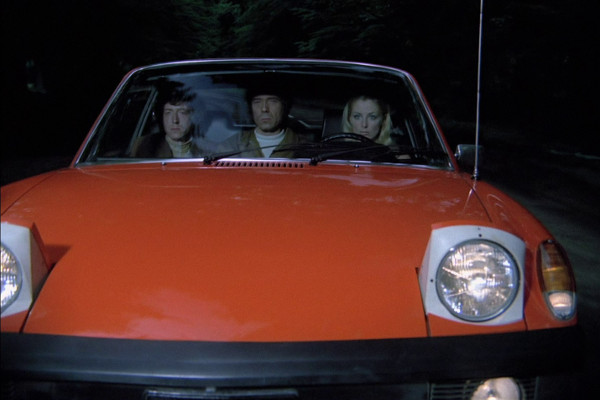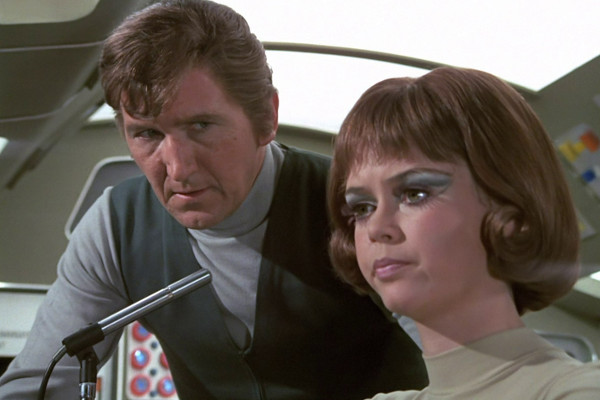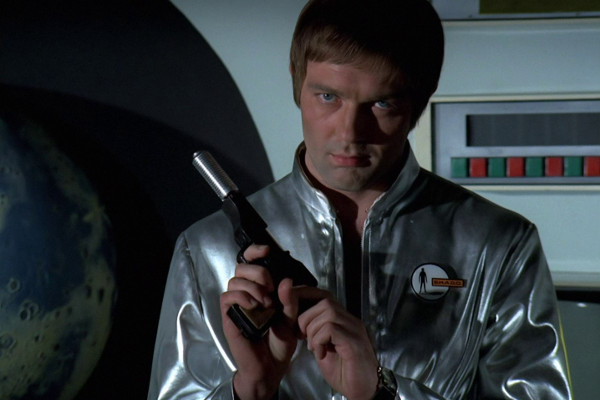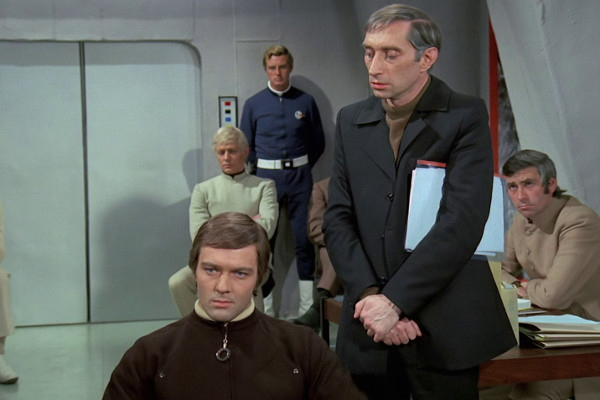


↑ Down 1 Place
The scope of UFO is sufficiently wide to ponder what stories could still have been told. While comic strips and some novelisations were released, the series itself still had potential when it ended. One striking idea would be what would happen if a terrorist threat faced SHADO in the middle of an alien landing? Well, The Psychobombs is that idea, but rendered in pulp terms. At the time the episode was made, IRA activity was ongoing, and a chance for some political commentary via association was there, but sadly dropped in favour of cult favourites Mike Pratt, David Collings and Deborah Grant being bestowed "super powers", including the ability to bend solid steel.
Of note is that, for quite a sexual series, then Clark (Collings) and his wife are shown in separate beds. Speaking of Collings, then his ability to play characters older than himself is quite insultingly flagged up in this instalment: his character is identified as "44", despite the fact that in real life he'd only just celebrated his 30th birthday when filming began. (Mike Pratt gets a compliment in the other direction, a 39-year-old actor playing 35.) Speaking of trivia, then Straker claims to be from Boston in this episode, though this could be a line he gives to a person he doesn't trust.
Collings and Grant took part in From Earth to the Moon, a 90 minute documentary about the making of the series that featured on the UK BluRay. Particularly notable is Grant describing the fun that she had in part, though she genuinely fell backwards at the end as she wasn't informed that the "electric cables" were fitted with fireworks. They completed the take, then took her to first aid for burn treatment.

↑ Down 11 Places
By some way the hardest episode of UFO to rank, The Cat With Ten Lives is objectively better than several entries ranked above it, but also is impossible to regard as part of the same series.
It guest stars Alexis Kanner, giving a typically mannered performance that has its moments of brilliance but also feels like he's in a different programme to everyone else. The plot is the strangest and most "out there" UFO ever did, which is the main reason why it's difficult to rate: an alien consciousness occupies the body of a cat, which in turn telepathically controls Kanner, causing him to turn against SHADO while hissing and raising his fingers like claws.
It's all given a quality production (save for the end, with uncustomarily poor model work) but it's hard to slot it in as part of the same series. It's even stranger with the order in which it was broadcast... produced 19th, it features new revelations about the aliens that goes against what is learnt about them in the other episodes. This would be fine if it went out later, as it falls under "newly discovered information"... but broadcast third, in September 1970, it not only alludes to some elements that viewers weren't even aware of at the time, but expressly contradicts them.
There is a subplot about Kanner's onscreen wife being kidnapped for organ harvesting (rather bluntly stated to Kanner by Colonel Veronica Lake) after we've found out she's pregnant. However, what is a very dark revelation, even for this series, isn't reflected on too closely, pushed down in the narrative in favour of a telepathic cat controlling Kanner even when the cat's left on Earth and Kanner's on Moonbase.
It's a bizarre, left-field narrative, funny for the wrong reasons, and watchable for same. At this stage it was obvious that any time a guest star appeared in the series they'd be dead before the end titles, which is another problem with that broadcast order... this shock twist technique should have been presented to viewers with better episodes. Instead we get Kanner's death after a group of dogs - who just happened to be around - chase the cat and break the telepathic link.
Lastly, it can't go unmentioned that two guest stars featured prominently in The Prisoner: Kanner is joined in a scene by Colin Gordon. With two of the regulars (Billington and Ventham) also having had roles in the series, it means that altogether five of the performers in this episode had also appeared in the McGoohan series. Maybe McGoohan was aware of this particular episode as a result, explaining why he once somewhat cruelly described UFO as "junk"?

↑ Down 1 Place
UFO often has a more adult stance than many other SF series by concerning itself with the minutiae of bureaucracy. Episodes like Close Up and Destruction are more focused on legislation and boardroom meetings than the actual aliens themselves. While commendable, it can make these episodes a little slower if you're not in the mood, and the biggest problem surrounding Conflict is that someone chose to call a more talky episode "Conflict", giving a false expectation of the contents.
Things do, however, get tense in the final moments as Straker takes a massive risk with everyone's safety just to prove a point. What begins as an effort to cut through red tape over funding ends with the possible destruction of the entire Earth SHADO HQ, all based on a hunch. That said hunch turns out to be correct is fairly standard stuff, though no less engaging because of it. On a purely objective level, then Conflict is better than many of the episodes ranked above it, but simply isn't as much fun.

↓ Up 6 Places
Computer Affair is one of a couple of UFO episodes that touches on racial tolerance. While well-meaning and earnest, such topics can often come over as ham-fisted when dealt with on television, and UFO is certainly no exception. In another episode (Survival) Commander Straker will tell black pilot Mark Bradley that he's so oblivious to skin tone that it wouldn't make a difference if he was "polka dot with red stripes". In the scripting stage it's charming and sweet... in execution it's toe-curlingly trite.
Here we first learn of a relationship between Mark and Gay, revealed because Gay hesitated in a word association test over the word "black". Elsewhere, Straker kills an alien by feeding it a truth serum after it refuses to talk, despite no indication that the aliens can speak English. As a result, his second-in-command, Colonel Freeman (George Sewell), threatens to resign and insists he won't change his mind... then changes his mind about thirty seconds later.
The real problem with episodes like this is that the viewers are made blatantly aware of a situation - Gay and Mark's relationship - before the characters are. So that rather than being taken by surprise, the audience is left waiting for the UFO personnel to catch up.
Despite all of these faults, and many more, the goofiness of this episode is immensely watchable.

↓ Up 6 Places
Previously derided as "one of UFO's sillier instalments" with a "one-note plot dragged out over 50 minutes", Kill Straker! is actually a fair bit better than given credit for six years ago.
Sure, UFO is at its best when it gets dark and has left-field plot twists, and a "Paul Foster is brainwashed into killing Straker" plot doesn't really go anywhere you wouldn't expect. But it's well put together and performed, even if we do get a shot of three white pilots entering the chutes for the Interceptors... before cutting to a shot of Mark in one of them. We all know that it wouldn't matter if Mark was polka dot with red stripes, but even so, it's one of the more notable mistakes in the series, along with things like the Interceptors being called back before firing in The Square Triangle... then returning to base without their missiles.
In 2003 the episode was released on DVD as part of a set in America, featuring a commentary track by Michael Billington and director Alan Perry. Jokey, informative and engaging, they reveal a great deal about the episode, including the revelation that Ed Bishop found Vladek Sheybal "difficult" to work with, and that when he hits Michael at the end of the episode, he's actually hitting him for real. The rewarding commentary was licensed for use to a later Australian DVD release, but didn't appear on any of the UK products.

→ No change
The concept of a main character on trial is not a unique one in TV sci-fi. It had happened in multiple episodes of various Star Treks (including an episode actually titled "Court Martial", which aired four years before this one), as well as numerous other genre shows. The big problem with such a concept - a central character is placed on trial, usually with the sentence being death - is that it requires you to believe that such an outcome might happen. And although the guilty verdict is revealed right away and UFO is a perversely dark series, it's just too much of a stretch to believe that Foster really will be executed as an military spy come the end titles.
Eventually Straker gets to the bottom of things and discovers that Foster was bugged without his knowledge, in what he admits is a "hairy coincidence". It's still not clear what will happen to the spy (Georgina Cookson, fresh from betraying No.6 in The Prisoner) and how they'll stop her revealing what she knows. Even stranger is that her signed affidavit to prove Foster's innocence is written under coercion by Straker, threatening to make her deaf and give her brain damage with an audio gun unless she signs. Presumably after the series ended Straker took up a job with the West Midlands police force.
This is also the episode that brings back the engaging Władysław Rudolf Z. Sheybal (Vladek Sheybal) as Dr. Doug Jackson. This was his third appearance in the series in terms of production order, after which he appeared in half the remaining episodes to be recorded, a very magnetic performer. The only downside here is that his role doesn't really make any sense... he's acting as prosecution to Foster, and isn't a core part of the SHADO team, even though other episodes show otherwise. ITC series are often great fun, but can regard interepisode continuity as a mere formality at times.

↑ Down 2 Places
Foster and an alien are trapped together on the Moon's surface, but learn mutual trust and friendship. If that sounds like a thin idea for a 48 minute episode, then Dennis Quaid got almost two hours of it in 1985 with Enemy Mine. It's an episode that sums up UFO in many ways, as it contains lots that's good, and lots that's pretty terrible... complete with Straker's aforementioned "polka dot" speech. However, it scores fairly high here for a customary dark twist, even if it doesn't all make perfect sense.
There is a feeling that perhaps the world building of the future could have gone further. The title sequence flashes up "1980", and Foster tells us here that it's April 12, 1981. When Paul visits his girlfriend, she's playing The Equals single "My Life Ain't Easy" from 1967. How much more impressive would it have been if they'd at least tried to predict a musical style? That said, the top two singles for the date were by Bucks Fizz and Shakin' Stevens, so maybe it's a wise move they stuck with Eddy Grant's old band instead...